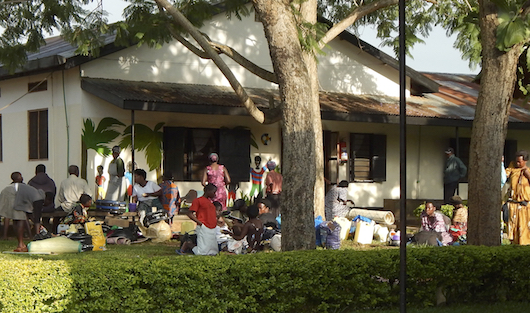Today was my third day on Pediatrics. Dr. Susan and I will split the ward in half and see each patient, in theory at least. She rounds on the sickest patients (i.e. those on oxygen) and I start seeing the other patients. Today, however, there was a new admission from last night who is very ill. He is a 2 year old with HIV and severe malnutrition. He only ways 7 kg and is so malnourished that his skin is paper-thin and basically peeling off. Very sad. Susan spent most of the morning seeing him, while I saw the rest of the patients. This was a good feeling, being able to manage a Peds ward.
Afterwards, we went to Doctor’s meeting and then Adult HIV Clinic. This lasted much longer than Peds HIV Clinic, stretching right through lunch until about 3 in the afternoon. I am learning much about HIV management, when to start anti-retrovirals, when to switch to second-line therapy, the adverse effects associated with each medication, and so on. Most of the patients are fairly stable and therefore quick visits, but sick patients do arrive as well who need admission. One lady was wheeled in by her family and she was obviously very ill, exhibiting wasting, a deep cough that brought up blood, severe weight loss, and diarrhea for several weeks. She was almost so weak she could barely turn her head. We obviously admitted her.
As for Peds, we see lots of malaria, some of it very severe with children who come in basically obtunded or unconscious. Febrile seizures are fairly common here, as is malnutrition, sickle cell, and pediatric cardiac disease surprisingly. Many of the complex cardiac patients eventually require referral to Mulago Hospital, which is the main University-based referral hospital in Kampala. The way the health system works in Uganda is varying degrees of medical complexity. At its most basic, there are local health clinics. Based on what they provide, they are rated in a category from I-IV. Then there are the local government hospitals. Above those are regional referral hospitals, of which Kiwoko is considered one, although it is funded predominately as a missionary hospital rather than government based. Our catchment area here is about half a million people. Mulago meanwhile serves the entire population of Uganda.
Many patients do not want to make the trip to Mulago, mostly for financial reasons. It is very difficult when we explain to parents that we would like to send patients for referral and they are either not able to pay for the consultation or even pay for transportation to Kampala. Superstitions also play a major role here. We had one patient leave with her baby (who has Down’s syndrome and known VSD found on echocardiography and is suffering from heart failure — she’s only 14 months old) yesterday without telling any of the staff because she had thought the parent of another baby had cursed her child. Another patient told us yesterday that she believed her baby was cursed. Coincidentally, she also has unexplained tachypnea (increased respiratory rate) and oxygen dependency without any fevers or signs of infection. We wanted to refer her to Mulago as well, but the mother states that because her baby is cursed, the doctors at Mulago will not be able to help any more than the doctors here at Kiwoko and that she needs to see the local witch doctor instead.
I just realized that I have not described a typical day here. Generally, the day starts at 8:15 with morning prayers, which we are all expected to attend. Afterwards, we have Doctor’s Meeting from 9 until 10 AM. This includes check-out from the night before as well as daily CME. Ward rounds start after this and generally continue until lunchtime. After lunch, we return to the wards for any admissions from OPD or “reviews” which are patients that OPD has sent over because the doctor there is not sure whether the patient actually requires admission. We also round on some of the sicker patients again in the afternoons.
One last interesting fact: just before I arrived a man was admitted to the hospital after he was attacked by a leopard! Several of my housemates here before me were here when he was admitted. He was out in his fields and farming when he was attacked by a leopard. He suffered pretty severe lacerations around his skull but survived. It was actually pretty near Kiwoko, which is a bit unnerving considering I go out running around here. Not something you’d see back in the States, unless you’re out west where you have to worry about mountain lion attacks. Tomorrow is my last day on Peds even though it’s the middle of the week.
Because I’m here for such a short time, I’m only cycling through each ward for only a few days at a time. I’m headed to either Maternity or NICU after that. And then, most excitingly, going this weekend to see the gorillas in Bwindi Impenetrable Forest!

